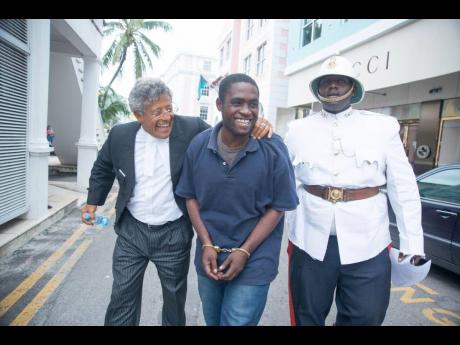Another major victory for Jamaican against Bahamian government
WESTERN BUREAU:
Jamaican Matthew Sewell, who was left to languish in a Bahamian prison for a combined period of nine years and nine months, has won another round in a lawsuit filed against the government of The Bahamas.
Yesterday, the Bahamian Court of Appeal refused the government’s application for an extension of time to appeal the ruling.
Sewell’s lawyers are seeking US$27.5 million in damages for breaches of his constitutional rights after their client was harassed relentlessly with false charges between 2006 and 2016, experiencing hell in and out of prison as the police drummed up unproven and unrecorded accusations.
Sewell’s first arrest was 10 days after arriving in The Bahamas to visit his father. He was 18 at the time. The 32-year-old, who is now being treated by psychiatrist Dr Wendel Abel, said he was never allowed due process and was abused and forced to live in inhumane conditions at the Bahamian detention centres.
Sewell said 10 days after his arrival in The Bahamas, he was accused of raping a six-year-old girl, and despite his pleas of innocence, was beaten by neighbours before being later arrested and charged by the police. Not assigned a lawyer, he said he was beaten repeatedly, fingerprinted, taken to court but was not asked to plea. During his detention, which lasted up to May 2008, he said no medical report for the child was submitted.
In April 2009, he said he was again arrested for rape of a 17-year-old and remanded in custody for another four years at the Fox Hill Prison, where he said the real ordeal began.
“The prison was very dirty. There was no toilet. We had to pass stool in a bucket in the cell in front of the other cell mates. I slept on the dirty floor for years as there was no mattress or beds in the cells. I would fight a lot because some of the prisoners would try to molest me,” he shared.
He also said he was moved to a dungeon cell for about six months, where, without the luxury of doors and windows, he would go for days without seeing sunlight. He said the cells were overrun with rats, and he was not allowed to have visitors. At times he said he had multiple suicidal thoughts.
In August 2013, Sewell said he was taken to the Supreme Court, where the judge “discharged the case” after he revealed that he had spent four years in prison without a trial.
Two months after his release, he was again arrested by the South Beach police, who accused him of being a Haitian pretending to be a Jamaican. They claimed to have made checks with the Registrar General’s Department and were told that there was “no record of him”, and so they were going to ship him off to Haiti.
Eventually, Sewell was forced to return to Jamaica in 2017 for his safety.
LANDMARK VICTORY
If awarded the amount being asked for by his lawyers, this would be the single largest payout by any court in that country and a landmark victory.
President of the Court of Appeal, the Hon. Sir Michael Barrett, in his summation yesterday, said the intended appellants – the attorney general, the commissioner of police, and the immigration and correctional services – had two weeks to appeal each order but were out of time.
“His case has been in the courts since 2015; started in the Supreme Court with a habeus corpus application ordering his release from the detention centre, where he spent almost 24 months, and overall, nearly 10 years in the prison system,” his lawyer, Doneth Cartwright, explained to The Gleaner.
She said that Sewell was in Fox Hill prison when his matters were dismissed but was then transferred to the detention centre, where he was said to be in breach of the immigration laws and had overstayed in The Bahamas, notwithstanding the fact that he was arrested 10 days after his arrival in the country.
“We proceeded with civil action, which took place during COVID-19, then Justice Ruth Bowe-Darville struck out the defence of the government for many reasons – they were negligent in filing their papers; they were delinquent, just not following the court orders; not preparing for the trial; not taking the matter seriously,” Cartwright noted.
HAD NO LIFE
In addition to that, in May of 2020, the judge ordered an interim payment of U$60,000.00 to Sewell, so when she struck out the defence she heard the matter in October on quantum (least amount).
“For almost 10 years, he missed out on the opportunity of education; of living a fairly reasonable life, having had the ambition of becoming a soldier in Jamaica, and he is now past the age to even join the Jamaica Defence Force,” lamented Cartwright.
She said Sewell won the case on liability and the lawyers moved to the assessment of damages. “Our submission is that he is entitled to about $27 million, given the precedence of similar matters in The Bahamas.” It was during the assessment that the government filed a notice of appeal without leave, and that was struck out.
They are now waiting on the ruling of Justice Bowe-Darville as it relates to quantum. The highest the Bahamian government has ever paid in a similar human rights case was US$640,000.
“The government lost the case because they continued to defend the indefensible. They had someone unlawfully arrested for almost 10 years. For that we feel we are entitled to exemplary damages,” argues Cartwright.

